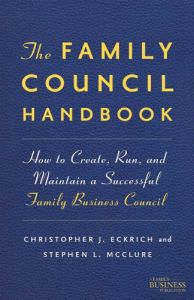Join getAbstract to access the summary!

Join getAbstract to access the summary!
Christopher J. Eckrich and Stephen L. McClure
The Family Council Handbook
How to Create, Run, and Maintain a Successful Family Business Council
Palgrave Macmillan, 2012
What's inside?
To avoid infighting, create a “family council” to run your family’s business dealings smoothly.
Recommendation
Family businesses often bring to mind infighting, chaos and nepotism – the latter sometimes resulting in the disastrous promotion of incompetent cousins. But according to family-business consultants Christopher J. Eckrich and Stephen L. McClure, the management of a family business doesn’t have to resemble a television soap opera. On the contrary, many family-based enterprises are more successful than other types of companies, because the degree of loyalty and commitment that relatives generally demonstrate toward their own business reaches a level that other firms can only dream of achieving. Eckrich and McClure promote the concept of the “family council” to help smooth familial relationships and business dealings. They suggest – though too often in unnecessary and recurring detail – the steps you can take to create your own family council. getAbstract recommends this practical approach to running a family business without drama, despite those cousins.
Summary
About the Authors
Christopher J. Eckrich and Stephen L. McClure are principals of the Family Business Consulting Group. Eckrich is also an adjunct professor at the University of Notre Dame. McClure has worked with family businesses for over 25 years.



















Comment on this summary